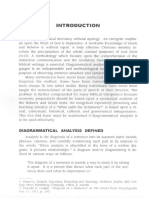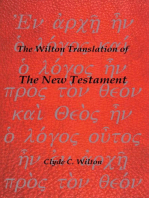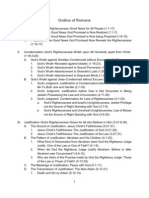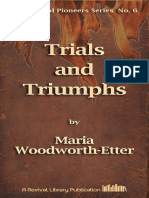God and His Word
God and His Word
Uploaded by
Francisco GarciaCopyright:
Available Formats
God and His Word
God and His Word
Uploaded by
Francisco GarciaCopyright
Available Formats
Share this document
Did you find this document useful?
Is this content inappropriate?
Copyright:
Available Formats
God and His Word
God and His Word
Uploaded by
Francisco GarciaCopyright:
Available Formats
COVENANT
THEOLOGICAL SEMINARY DISTANCE LEARNING
God and His Word
Dr. Michael Williams
COVENANT THEOLOGICAL SEMINARY The Seminary of the Presbyterian Church in America
Covenant Theological Seminary, 12330 Conway Road, St. Louis, MO 63141 (314) 434-4044 Copyright 2006. All Rights Reserved
ii
ST200: God and His Word Professor: Dr. Michael Williams I. Course Description: An introduction to theology and hermeneutics, and a study of the doctrines of revelation, Scripture, and God. II. Course Goals: During the course the student will 1. develop an understanding of the nature of the Bible as a revelation of Gods character, historical action, redemptive purpose, and norm for faithful kingdom living; 2. develop an introductory appreciation for both the diversity and unity of Scripture within its covenantal orientation and kingdom trajectory; 3. become familiar with the science of biblical hermeneutics through a survey of hermeneutical issues and strategies; 4. be exposed to the biblical teaching concerning God and the churchs historical-theological reflection upon God 5. develop a greater personal understanding of the historical and personal nature of God, his providential care for his world and his personal fatherly and kingly relationship to us and the church 6. develop biblically informed, theologically sound, and historically shaped and tested convictions concerning the doctrines of God and revelation III. Course Objectives: By the end of the course the student will be able to 1. articulate and defend an evangelical understanding of the doctrine of Scripture as the inspired and inerrant Word of God; 2. show a growing confidence with and ability to read and interpret the Bible faithfully 3. describe the character and ways of the God of biblical revelation 4. compare a biblical understanding of God and his ways to alternative understandings, ancient and modern. We will pursue these goals and objectives through a number of means: 1. Theological interdisciplinary and synthetic course lectures and discussions, making use of exegetical, theological, and historical resources as they enlighten the issues under discussion 2. The reading of significant texts that introduce and develop the different elements of the course 3. Assessment of the students understanding and involvement via a series of written assignments IV. Texts: All students are required to read the following: Lesslie Newbign, Proper Confidence Al Wolters, Creation Regained Robert Peterson and Michael Williams, Why Im Not an Arminian Sandra Richter, The Epic of Eden: A Christian Entry into the Old Testament
God and His Word
2006 Michael Williams & Covenant Seminary
iii
Michael Williams, Far as the Curse is Found Course/Content Outlines and Readings on the Portal
A good theological dictionary will prove to be an invaluable resource for your theological studies. I strongly suggest that you purchase at least two. Two of the better recent one volume general dictionaries are Walter Elwells Evangelical Dictionary of Theology (Baker, 2nd ed, 2001) and Sinclair Fergusons New Dictionary of Theology (IVP, 1988). In the fast few years similar dictionaries devoted specifically to biblical theology have appeared. Both Walter Elwells Evangelical Dictionary of Biblical Theology (Baker, 1996) and Desmond Alexanders New Dictionary of Biblical Theology (IVP 2000) are useful tools. If you can purchase only two during you seminary years aim for the works from Baker. Both are superior to their counterparts from IVP. You might also find a dictionary of theological terms useful, especially if you are new to the study of theology. Grenz, Guretzki, and Nordling have produced Pocket Dictionary of Theological Terms (IVP 1999).
V. Schedule Week 1
Reading and Assignment Schedule Lectures 1, 2, 3, 4 Title/Topic, Assignments Lecture 1 contains introductory course information. There is no corresponding outline for Lecture 1. Lectures 2-4: Theology and the Postmodern Context; Revelation Readings 1. Williams, Introduction to Theology; 2. Williams, Speaking the Gospel to Postmodern Ears. 3. Start reading Newbigin, Proper Confidence Newbigin, Proper Confidence 1. Ferguson How Does the Bible Look at Itself 2. Williams, Paradosis: Tradition 3. The Chicago Statement on Biblical Inerrancy 4. Start reading Wolters, Creation Regained Wolters, Creation Regained 1. Williams, Systematic Theology as a Biblical Discipline 2. Vanhoozer, Lost in Interpretation? 3. Silva, Contemporary Theories of Biblical Interpretation
Week 2 Week 3
5 6, 7, 8
Revelation Doctrine of Scripture
Week 4 Week 5
9, 10, 11 12, 13, 14
Biblical Storyline Biblical Storyline, Hermeneutics,
God and His Word
2006 Michael Williams & Covenant Seminary
iv
Week 6 Week 7 Week 8
15, 16, 17 18, 19 20, 21, 22
The Covenant Lord The Covenant Lord; Names, Roles, and Historical Acts; the Trinity. The Trinity; Systematic Survey of how God works in the world Survey of the Biblical Story
Week 9
23, 24
1. Course outline, pp. 31-42 2. Richter, Epic of Eden, chapters 1-6 1. Course outline, pp. 43-61 2. Richter, Epic of Eden, chapters 7-9 1. Why Im Not an Arminian, chaps. 2, 5, 6 2. Far as the Curse is Found, chaps. 1-5 Far as the Curse is Found, chaps 6-14
God and His Word
2006 Michael Williams & Covenant Seminary
You might also like
- 1 John 1 Interlinear BibleDocument6 pages1 John 1 Interlinear BibleVasile SilionNo ratings yet
- Faithful to the End: An Introduction to Hebrews Through RevelationFrom EverandFaithful to the End: An Introduction to Hebrews Through RevelationNo ratings yet
- Viviano, Pauline - The Senses of ScriptureDocument4 pagesViviano, Pauline - The Senses of Scriptureraschau_443981483No ratings yet
- James Commentary by Robin WatsonDocument129 pagesJames Commentary by Robin WatsonRobin Watson100% (8)
- Between Notion and Reality DoshiDocument6 pagesBetween Notion and Reality DoshiAbraham Panakal100% (1)
- ATS Model of ExegesisDocument16 pagesATS Model of ExegesisDavid DeSilvaNo ratings yet
- A Layman's Translation of The New TestamentDocument738 pagesA Layman's Translation of The New TestamentJoel CartmellNo ratings yet
- Devotion - Men in the Bible: Journey to Rediscover God, the Bible and Yourself as a ManFrom EverandDevotion - Men in the Bible: Journey to Rediscover God, the Bible and Yourself as a ManNo ratings yet
- Inerrancy of The Bible by Gideon Samuel StephenDocument6 pagesInerrancy of The Bible by Gideon Samuel StephenSamuel Gideon Stephen100% (2)
- SB004 - Interpretation of Philippians 1-6Document5 pagesSB004 - Interpretation of Philippians 1-6RaftiniNo ratings yet
- God's Second Letter To The Corinthians: The Word Of God Library, #25From EverandGod's Second Letter To The Corinthians: The Word Of God Library, #25No ratings yet
- Yahweh's Elegant Speeches of the Abrahamic Narratives: A Study of the Stylistics, Characterizations, and Functions of the Divine Speeches in Abrahamic NarrativesFrom EverandYahweh's Elegant Speeches of the Abrahamic Narratives: A Study of the Stylistics, Characterizations, and Functions of the Divine Speeches in Abrahamic NarrativesNo ratings yet
- A Biblical Guide to Salvation: Rediscovering the Doctrine of Salvation as Taught by the Scriptures and the Early ChurchFrom EverandA Biblical Guide to Salvation: Rediscovering the Doctrine of Salvation as Taught by the Scriptures and the Early ChurchNo ratings yet
- Genesis to Revelation: Joshua, Judges, Ruth Leader Guide: A Comprehensive Verse-by-Verse Exploration of the BibleFrom EverandGenesis to Revelation: Joshua, Judges, Ruth Leader Guide: A Comprehensive Verse-by-Verse Exploration of the BibleNo ratings yet
- Alzheimer’s & Dementia: Must-Read for Caregivers & Loved Ones: Helpful Hints on What to Possibly Experience with Family/Legal and Psychological AspectsFrom EverandAlzheimer’s & Dementia: Must-Read for Caregivers & Loved Ones: Helpful Hints on What to Possibly Experience with Family/Legal and Psychological AspectsNo ratings yet
- New Testament Greek Words For SINDocument6 pagesNew Testament Greek Words For SINJohn Kamal WadieNo ratings yet
- Diagramatical Analisis-Lee L. Kantemwein 2007Document27 pagesDiagramatical Analisis-Lee L. Kantemwein 2007julio100% (1)
- Review Alexander, T. Desmond, Rosner, Brian (HRSG.) New Dictionary of Biblical TheologyDocument4 pagesReview Alexander, T. Desmond, Rosner, Brian (HRSG.) New Dictionary of Biblical Theologygersand6852No ratings yet
- 8 Types of Connectives in The English LanguageDocument1 page8 Types of Connectives in The English LanguageYap Jie MinNo ratings yet
- Eon 1Document280 pagesEon 1LewisMuneneNo ratings yet
- Joseph Exell - Biblical Illustrator - RevelationDocument1,109 pagesJoseph Exell - Biblical Illustrator - RevelationLeonardo AlvesNo ratings yet
- Summary of Bill Mounces Basics of BiblicDocument41 pagesSummary of Bill Mounces Basics of BiblicAlexandre Rocha Lima e MarcondesNo ratings yet
- Objectivity in Biblical Interpretation HoweDocument254 pagesObjectivity in Biblical Interpretation HoweTaye KassaNo ratings yet
- The Relationship Between Inspiration andDocument14 pagesThe Relationship Between Inspiration andAdaora Buchi-Nwosu100% (1)
- Thielman New Testament TheologyDocument6 pagesThielman New Testament Theologymylove777No ratings yet
- Syllabus For Old Testament 1 Union University MCS 500 (Memphis) Genesis-Esther, Psalms Dr. Jason B. HoodDocument11 pagesSyllabus For Old Testament 1 Union University MCS 500 (Memphis) Genesis-Esther, Psalms Dr. Jason B. HoodWilianCNo ratings yet
- A Plain Introduction to the Criticism of the New Testament (Vol. 1&2): For the Use of Biblical Students (Complete Edition)From EverandA Plain Introduction to the Criticism of the New Testament (Vol. 1&2): For the Use of Biblical Students (Complete Edition)No ratings yet
- Uncovering the Treasures of the Apocalypse: Keys to Unlocking the Mysteries of the Book of RevelationFrom EverandUncovering the Treasures of the Apocalypse: Keys to Unlocking the Mysteries of the Book of RevelationNo ratings yet
- Daniel 9 HandoutDocument11 pagesDaniel 9 HandoutDavid JiménezNo ratings yet
- Cries from the Heart: Stories of Struggle and HopeFrom EverandCries from the Heart: Stories of Struggle and HopeRating: 4.5 out of 5 stars4.5/5 (4)
- Treasures from an Old Book: Ancient Wisdom for a Modern WorldFrom EverandTreasures from an Old Book: Ancient Wisdom for a Modern WorldNo ratings yet
- These Things Happened as Examples: A Guide for the Interpretation of Biblical Historical NarrativeFrom EverandThese Things Happened as Examples: A Guide for the Interpretation of Biblical Historical NarrativeNo ratings yet
- Peter, Paul and Jacob, Comments On First Peter, Philippians, Colossians, First Thessalonians, Second Thessalonians, First Timothy, Second Timothy, Titus, Jacob (James)From EverandPeter, Paul and Jacob, Comments On First Peter, Philippians, Colossians, First Thessalonians, Second Thessalonians, First Timothy, Second Timothy, Titus, Jacob (James)No ratings yet
- The Branch: A Plausible Case for the Substructure of the Four GospelsFrom EverandThe Branch: A Plausible Case for the Substructure of the Four GospelsNo ratings yet
- Prayer as Divine Experience in 4 Ezra and John’s Apocalypse: Emotions, Empathy, and Engagement with GodFrom EverandPrayer as Divine Experience in 4 Ezra and John’s Apocalypse: Emotions, Empathy, and Engagement with GodNo ratings yet
- Understanding Deuteronomy On Its Own TermsDocument5 pagesUnderstanding Deuteronomy On Its Own TermsAlberto RodriguesNo ratings yet
- Misreading Ritual: Sacrifice and Purity for the Modern-Day GentileFrom EverandMisreading Ritual: Sacrifice and Purity for the Modern-Day GentileNo ratings yet
- Christ Simply: A Chronological Self-Guided Study of the Life of ChristFrom EverandChrist Simply: A Chronological Self-Guided Study of the Life of ChristNo ratings yet
- Bride02.The Spirit and The Bride Say, Come (Rev. 22.16-20) (2018) PDFDocument4 pagesBride02.The Spirit and The Bride Say, Come (Rev. 22.16-20) (2018) PDFchristieNo ratings yet
- Applied Christianity: A Handbook of 500 Good Works: Christian Life, #2From EverandApplied Christianity: A Handbook of 500 Good Works: Christian Life, #2Rating: 5 out of 5 stars5/5 (1)
- Outline of Romans Arial UnicodeDocument4 pagesOutline of Romans Arial UnicodeArdel B. CanedayNo ratings yet
- Modern Christianity in the Holy Land: Development of the Structure of Churches and the Growth of Christian Institutions in Jordan and Palestine; the Jerusalem Patriarchate, in the Nineteenth Century, in Light of the Ottoman Firmans and ThFrom EverandModern Christianity in the Holy Land: Development of the Structure of Churches and the Growth of Christian Institutions in Jordan and Palestine; the Jerusalem Patriarchate, in the Nineteenth Century, in Light of the Ottoman Firmans and ThNo ratings yet
- (22847308 - Perichoresis) Historical or Presuppositional Apologetics - A Henrecian Response To Michael Licona's New Historiographical Approach PDFDocument19 pages(22847308 - Perichoresis) Historical or Presuppositional Apologetics - A Henrecian Response To Michael Licona's New Historiographical Approach PDFLalpu Hangsing100% (1)
- 158 - The Textual Basis of Modern TranslDocument16 pages158 - The Textual Basis of Modern TranslAnonymous mNo2N3100% (1)
- The Therapeutic Bible – The Gospel of Mark: Acceptance • Grace • TruthFrom EverandThe Therapeutic Bible – The Gospel of Mark: Acceptance • Grace • TruthNo ratings yet
- Leadership of MuhammadDocument8 pagesLeadership of MuhammadSaiyidah Hikmah67% (3)
- Belief in Ellen G. White As A Prophet: Should It Be Made A Test of SDA "Fellowship"? by Roger W. CoonDocument22 pagesBelief in Ellen G. White As A Prophet: Should It Be Made A Test of SDA "Fellowship"? by Roger W. CoonsirjsslutNo ratings yet
- The Lotus Sutra Chapter 7Document20 pagesThe Lotus Sutra Chapter 7Pushpinder Singh SandhuNo ratings yet
- Heart of DarknessDocument2 pagesHeart of DarknessNisar SharfiNo ratings yet
- The University of Chicago Press Is Collaborating With JSTOR To Digitize, Preserve and Extend Access To Journal of Near Eastern StudiesDocument13 pagesThe University of Chicago Press Is Collaborating With JSTOR To Digitize, Preserve and Extend Access To Journal of Near Eastern StudiesMiqdaad VersiNo ratings yet
- Tolbert McCarroll - Tao Te ChingDocument36 pagesTolbert McCarroll - Tao Te Chingdjblock23100% (1)
- PermissibilitySalawatSalam PDFDocument26 pagesPermissibilitySalawatSalam PDFsarkar999No ratings yet
- Decision Making and The Will of GodDocument4 pagesDecision Making and The Will of Godcynthia budimanNo ratings yet
- Advancing Rational Faith - One Religion For All Sons and Daughters of Adam & EveDocument1 pageAdvancing Rational Faith - One Religion For All Sons and Daughters of Adam & Eveehsanbuttdr5060No ratings yet
- Silas SummaryDocument9 pagesSilas Summary'Christine RoxasNo ratings yet
- Fruit of The Spirit GoodnessDocument6 pagesFruit of The Spirit GoodnessPastor Jeanne100% (1)
- Worship SongDocument1 pageWorship SongAngeline AbaiNo ratings yet
- Alchemist PT 2Document3 pagesAlchemist PT 2vermakhwaish1105No ratings yet
- Evans Pritchard AzandeDocument66 pagesEvans Pritchard AzandeGuilherme Werlang100% (1)
- The Red LineDocument223 pagesThe Red Linetheredlinebook100% (2)
- 哲学原着选读第一卷:古代和中世纪哲学Document289 pages哲学原着选读第一卷:古代和中世纪哲学ombajraNo ratings yet
- Quote by Charles A. Lindbergh - "Within The Hour, I'll Land, and Strangely Enoug... "Document1 pageQuote by Charles A. Lindbergh - "Within The Hour, I'll Land, and Strangely Enoug... "David MutiloaNo ratings yet
- March 11 BulletinDocument2 pagesMarch 11 BulletinstdennisparishNo ratings yet
- 9-Anniversary Death PDFDocument3 pages9-Anniversary Death PDFk actNo ratings yet
- Religion As A SurvivalDocument5 pagesReligion As A SurvivalMandela Bright QuashieNo ratings yet
- Ask, Seek and KnockDocument2 pagesAsk, Seek and KnockdbyouthcentrepuneNo ratings yet
- Woodworth-Etter Trials and TriumphsDocument136 pagesWoodworth-Etter Trials and TriumphsJan Kaufmann100% (3)
- Principles Every Salafi Should Know - Shaykh Ahmad BāzmoolDocument7 pagesPrinciples Every Salafi Should Know - Shaykh Ahmad Bāzmoolhttp://AbdurRahman.org50% (2)
- Live Your Life As Infinite ConsciousnessDocument92 pagesLive Your Life As Infinite Consciousnessruigomes44100% (4)
- Theios Aner Hellenistic JudaismDocument3 pagesTheios Aner Hellenistic JudaismCrossamaniaNo ratings yet
- Devotions For Gospel of Mark (Sonlight Core 1 Bible)Document6 pagesDevotions For Gospel of Mark (Sonlight Core 1 Bible)Julia CamenischNo ratings yet
- Myths About The Vivekanand On ISLAM - Part I by Arun ShourieDocument6 pagesMyths About The Vivekanand On ISLAM - Part I by Arun ShourieNeon SinghNo ratings yet
- End of The World Coded in The QuranDocument4 pagesEnd of The World Coded in The QuranMau UdemNo ratings yet
- What Is The Meaning of TawheedDocument12 pagesWhat Is The Meaning of Tawheedshahaznie86No ratings yet

























































































